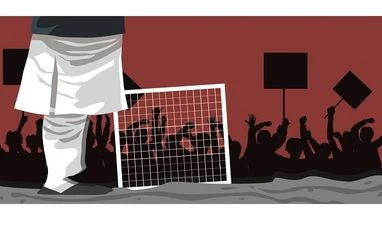The Union Budget will be overshadowed by the ongoing mass protests across India, and the government has missed the chance to narrow its focus and concentrate on the economy. This is not deliberate and is the result of an error in judgment from the prime minister.
He has been seeking to defuse the anger and the passion. But he has failed because he does not really understand what underpins this nationwide movement against the citizenship laws, and so doesn’t comprehend how to overcome it.
There was an opportunity to hit pause on the protests, if not an outright stop, in the Supreme Court this week, but that opportunity was not taken.
The attorney general could have voluntarily sought a stay on the Citizenship Amendment Act till the court sent down its judgment on its constitutionality. His instructions were instead to stall. This he succeeded in achieving. The government had filed no response to the 60 or so petitions it had already received weeks ago. But the judges chose to give the Modi government another four weeks, reasoning that the Centre had not received all the petitions.
The question is what the delay will achieve. The prime minister may think things will blow over in that time. They won’t, and this is why the Budget will suffer as a result.
When you have little or no engagement with the other side, you cannot figure out what to do to engage, negotiate with, crush or pacify them. This is the case with the Bharatiya Janata Party (BJP) and the people it is faced with in the anti-Citizenship Amendment Act (CAA) movement.
Before independence and before the rise of the Muslim League under MA Jinnah, only 3 per cent of the Congress party’s members were Muslims. After Jinnah’s ascendancy even this modest number fell dramatically, and in all honesty there was no meaningful Muslim representation in Congress. This is why Abul Kalam Azad, a great intellectual, had to suffer being called the “show boy” of the Congress Party. It was not an unfair slur to make: It honestly reflected the numbers. The absence of Muslims in Gandhi’s and Nehru’s Congress made them unaware of what the community wanted, which was a fair share in power, and certainly unaware of the strength of its feeling.
The situation in the BJP today is worse. It has always had one or two national representatives, never popularly elected, who are its fig leaf. Names like Sikander Bakht, Mukhtar Naqvi and Shahnawaz Hussain come to mind. Out of the BJP’s 303 Lok Sabha MPs, none is a Muslim.
Neither Naqvi nor Hussain has come to the anti-CAA protests and would not dare to come. They know they are show boys in the true sense of the word. But that reality also means the BJP has zero contact at the ground level with the protestors, who are to a large extent Muslim, joined by students and a smattering of the group contemptuously called liberals.
The government does not have a sense of the energy and the resolve of those on the street because it is not there and the people it knows are not there. The other reason for its ignorance of what it is faced with is that to the largest extent these are spontaneous and not politically led. Other than in West Bengal, the crowds in the rest of India are leaderless.
Illustration: Binay Sinha
This means the political parties, friends and even adversaries, Modi and Shah rub shoulders with in Parliament also have little or no connect with the anti-CAA movement.
In Uttar Pradesh, Akhilesh Yadav’s Samajwadi Party chose not to support the protestors, wary of the communal spin given to them and the Yadav voters will react negatively. Yadav and Mayawati may have assumed also that the hard posture of the Uttar Pradesh government would have broken the spirit of those on the street. This did not happen and sit-ins are now underway in Allahabad, Azamgarh and Kanpur other than Lucknow.
All of this means that the political establishment is unconnected and dislocated from the millions who seek change. Despite the attempted clarification offered by the prime minister, there is no clarity on what is going to happen regarding citizenship. He said that his government had not formally discussed the National Register of Citizens so far. That doesn’t really mean anything and as assurances go, it is weak. It has sent a clear message neither to the protestors nor the state.
They are still aware that from April 1, the National Population Register will begin to be rolled out. In many states like Bihar and Odisha there is ambiguity about what will happen. In BJP-run states it is clear that the process will unfold and produce chaos.
In Bangalore, the homes and shops of 300 people were razed on the accusation that they were Bangladeshi. The media reported that they were not, but so what if they were? The state must follow due process and not put up its xenophobia for all the world to see.
To the protestors looking on at such events across the country, this will be a further reason to dig in and not give up. They are fighting for their constitutional rights and for survival. This is a different kind of thing than the protests this government or any previous Indian government is used to. And they will not end because of the usual tactics of delay and brutality.
Unlock 30+ premium stories daily hand-picked by our editors, across devices on browser and app.
Pick your 5 favourite companies, get a daily email with all news updates on them.
Full access to our intuitive epaper - clip, save, share articles from any device; newspaper archives from 2006.
Preferential invites to Business Standard events.
Curated newsletters on markets, personal finance, policy & politics, start-ups, technology, and more.
)